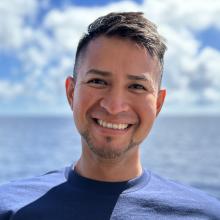
Ignacio Rueda
Tell us about your work/research. What kinds of things do you do?
My research takes place far below the ocean surface in Hydrothermal vents. The hydrothermal vent fluids originating from the Earth’s crust are super-heated and chemically altered. The chemical properties of the vents enable chemosynthetic organisms to establish epicenters of incredible biodiversity and unique food webs. During my time on the E/V Nautilus, we will use next-generation autonomous mapping vehicles to collect data at hydrothermal vents in Hawaii. Along with data from a previous expedition at the exact location, I will create 3D photogrammetry models to quantify the changes in structural complexity over time.
What sparked your initial interest in your career?
As a non-traditional student who began college in my late twenties, my interest in marine science took years of refinement and yearning to make a positive change. During my undergraduate career, I began researching the physiological impact on coral reefs due to anthropogenic stressors. Studying these keystone species ignited my desire to understand ecosystem dynamics. Now that I am in a master’s program, I have the opportunity to broaden my horizons and study an ecosystem that functions similarly to coral reefs but is chemically and geographically distinct. In researching hydrothermal vents, I began to set the foundations that will lead me to better understand and manage unique ecosystems for a fulfilling career.
Who influenced you or encouraged you the most?
My undergraduate colleagues and advisor undoubtedly influenced me the most. The laboratory environment I was a part of nourished my growth as a researcher, communicator, and personal development. During this time, I began conducting scientific research outside of the classroom. This led to me traveling far from home, exposing me to the possibilities of where research could take me. Any scientist worth their salt will know that embarking on this career comes with many triumphs and many more defeats. When I doubted my abilities, my colleagues reminded me that these moments led to my becoming the scientist I strive to be. The lab's growth-nurturing environment helped me expand my scientific toolkit and take on any research project I set my eyes on.
What element of your work/study do you think is the most fascinating?
What I find most fascinating about my work is the desire for life to proliferate in inhospitable environments. Most species found in the ocean could not live under such immense temperatures and chemical extremes. However, the bacterial community that thrives in these environments sets the foundations for organisms to flourish. Being a part of a project that provides me the avenue to reconstruct 3D models to detect the subtle nuances of discrete changes reassures me that my line of work has quantifiable relevance.
How did you get involved with the Ocean Exploration Trust?
The Office of Naval Research is funding my master’s research. The research I will embark upon will be used to understand the precision and accuracy of Next-Generation Autonomous Mapping Vehicles in marine environments aboard the E/V Nautilus. This research allowed me to get involved with the Ocean Exploration Trust. Additionally, this research opportunity offers an avenue for underrepresented communities in Puerto Rico to conduct research alongside the Ocean Exploration Trust.
What other jobs led you to your current career?
There are many research endeavors I can draw upon that led to my current career choice. Studying abroad in Belize and Hawaii exposed me to distinct ecosystems. I took it upon myself to find any opportunity that could teach me something new. However, it was during my time aboard the R/V Langseth mapping the ocean floor along the West Coast was where I was first exposed to this line of research. The opportunity was due to my participation in the STEMSeas program, which was completely different than anything I had ever done. Through these ventures, I learned that I did not want to place limitations on the location or subject matter that opened up to me.
What are your degrees and certifications?
Bachelor of Science in Marine Biology – Texas A&M University-Corpus Christi
What are your hobbies?
My hobbies include rock climbing, scuba diving, free diving, and traveling the world as much as possible.
What advice would you give someone who wants to have a career like yours?
The best advice I can suggest is to establish a non-linear career. Interest in one field or aspect can sometimes be a limiting factor if this interest is not well-rounded in other disciplines. It is okay to go off the deep end and explore a subject in your master’s/Ph.D. that you may not have studied in your undergrad. Yes, there are many paths you can follow, but there’s always time to change the road you’re on.
Expeditions
Ignacio participated in the following Ocean Exploration Trust expeditions:
